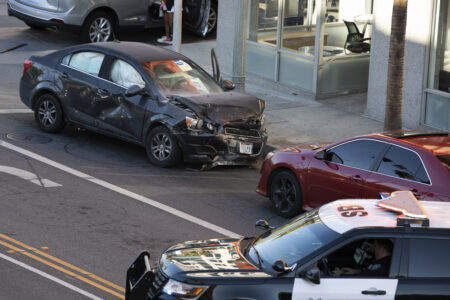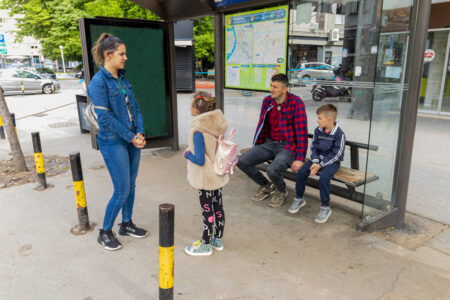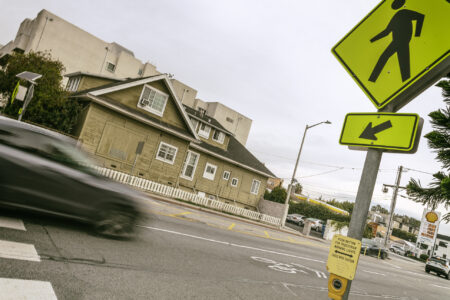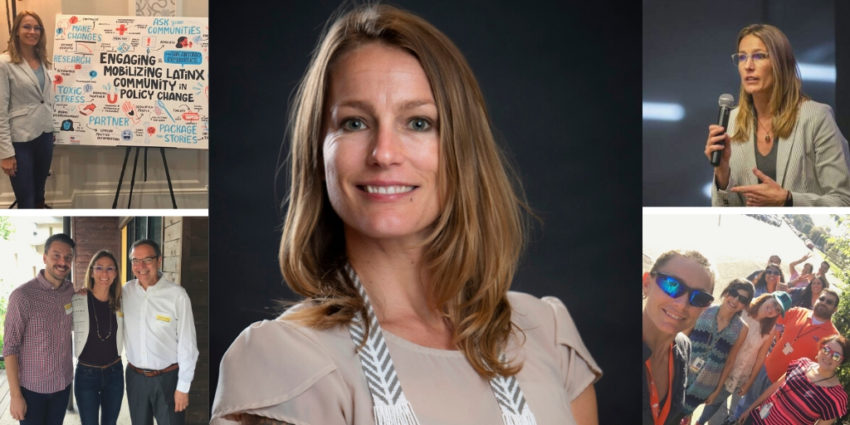
Share On Social!
Amanda Merck isn’t only a content curator for Salud America! at UT Health San Antonio, a member of many health committees, and an urban planning student at the University of Illinois at Urbana-Champaign.
She is also a fighter for equitable transportation, equitable access to parks, and an advocate for children who experience trauma.
Merck is a poster child for civic engagement for health equity─and she is dedicating her time and career to help countless others become civically engaged, too.
Merck: ‘Never Any Talk about Civic Engagement’
Merck grew up in many different places including California, Texas, and Montana.
As the daughter of a low-income, high-school dropout, working was meant to pay the bills.
“There was never any talk about civic engagement nor politics,” Merck said.
The family emphasized the importance of education, but they still lacked resources.
So, years later, after marrying her now-former spouse who was enlisted in the United States Air Force and gaining some stability from her social network in South Carolina, Merck decided it was time to go back and her pursue her education.
Merck’s Ah-Ha! Moment
Merck got her first taste of public health while working for an environmental company.
“We cleaned up when freight trucks would crash and spill diesel all over the place,” Merck said.
When transformers would blow, they would clean up PCBs, or polychlorinated biphenyls, highly toxic industrial compounds.
“This would happen to completely innocent people, they were exposed to toxic chemicals,” Merck said. “This was an injustice to many.”
What followed was Merck pursuing both her bachelor’s degree at American Military University and master’s degree in public health at UT School of Public Health.
In her master’s program, she found out about systematic inequities when it came to local parks.
“In many cities, great parks were only on the affluent side of town.”
As she did more research, she was intrigued.
Questions kept popping up: Who makes all these decisions about where parks go that is causing so many inequities? Who is in a position to make equitable changes?
“The problem isn’t poor people, it’s poor conditions,” said Merck. “It’s not about willpower. It’s about walkability.”
Merck and Pursuing Civic Engagement
Merck wanted to make a difference. She joined the San Antonio Active Living Council in 2014. The council often discussed strategies and tactics to get people active.
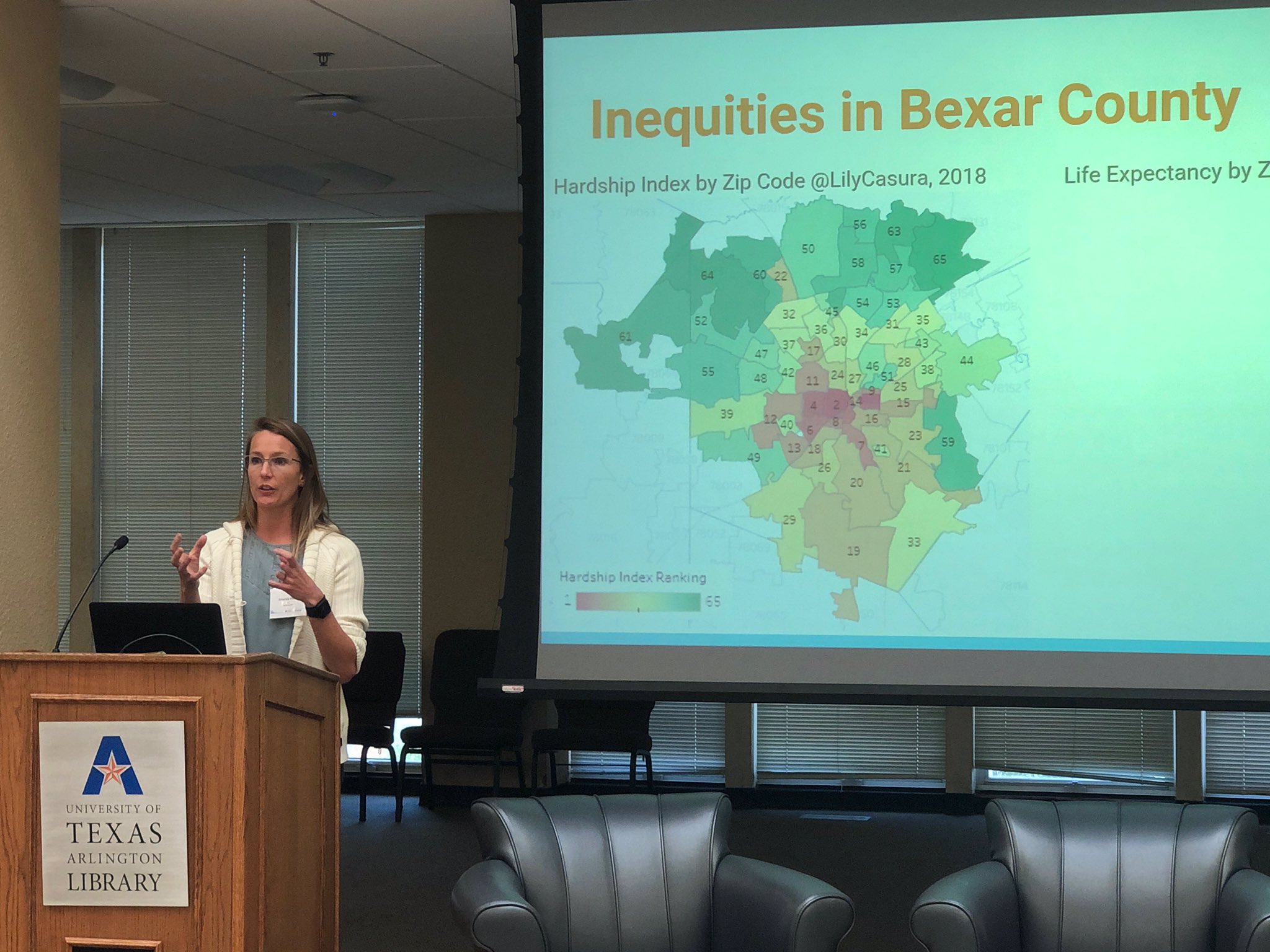
“They were a group talking about policies instead of programs,” Merck said.
At the time, there were many other committees that Merck joined. But the focus of these discussions often focused more on individual-level behavior change and programs.
“It drove me crazy that they thought it was easy for low-income working folks; that they could just go to the gym, workout, and lose weight,” Merck said.
It’s not that simple. Social determinants play a major role in our overall health.
Latino children in underserved communities often lack infrastructure for and access to healthy food options, spaces to be physically active, affordable housing, and public transit. This causes health inequities in this population.
“How can we expect people to be active if we built our cities wrong?” Merck asked.
Merck’s First Success against Inequity
At the time, Merck lived on the Southside and frequently visited Brown Park. She noticed that on Saturday mornings, the park was locked and did not open until 9 a.m. On weekdays the park closed at 5 p.m.
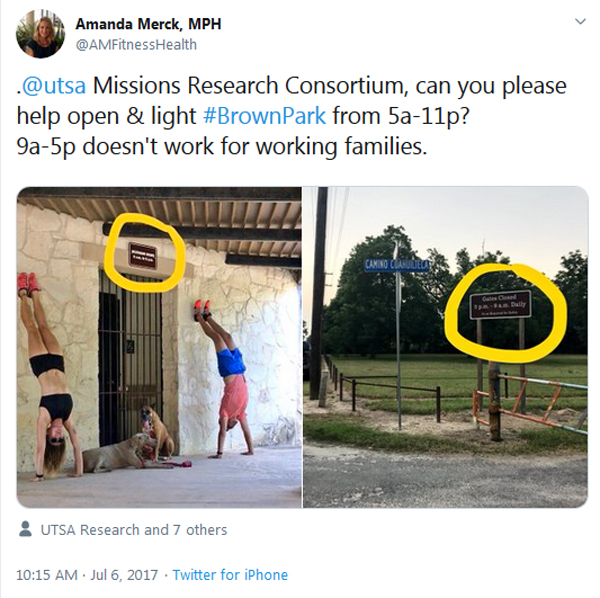
This was an injustice.
“Residents should have access from sun up to sun down,” Merck said.
At one point, Merck’s vehicle got locked in the park at 5 pm while she was riding her bike on the Westside Creek Trails. When she returned, she was threatened with a fine of $250. She knew this criminalized recreation and created an inequity for many who are on a fixed income.
She wanted to change this injustice.
Merck started to make countless of phone calls. She started to “troll on Twitter” trying to get decisionmakers’ attention.
For quite some time, Merck tried contacting many and never heard back.
“Don’t make it hard for people to be heard,” she said of municipal communication channels.
She contacted her council member, the San Antonio Parks, The National Parks, and the San Antonio River Authority.
Finally, the issue broke through to the San Antonio River Authority Board of Directors.
She found out Brown Park was an agenda item at the board meeting. They were proposing solar gates timed with daylight, instead of manually locking the park from 5 p.m to 9 a.m.
“Somehow, this issue made it made it to the board,” she said.
She stood up and talked to the board and shared reasons to keep Brown Park open from sun up to sun down.
However, she’s still working on keeping the park bathrooms open past 5 p.m., too. And it still doesn’t have a water fountain, either.
Merck Got More Civically Engaged through Boards
Through her experience at Brown Park and the Active Living Council, Merck was gaining confidence to speak up more in meetings.
She recognized the impact she made in the decision-making process.
This drove her to apply to be on multiple boards.
The San Antonio City Council appointed Merck to the SA2020 Strengthen Families and Well-Being board. In 2018, Merck was also appointed as a board member of VIA Metropolitan Transit, the public transit agency serving San Antonio.
Merck continues to use her voice to make known the inequities when it comes to transportation.
But that isn’t all she’s doing.
Merck Is Enabling Others toward Civic Engagement
At Salud America!, Merck is part of a communications team that aims to inspire people to drive community change for health equity for Latino and all kids.
She creates opportunities for people to engage their voice for action.
For example, Merck enabled Salud America! members to successfully push Texas leaders to adopt a zero-fatality goal on state roads. She also enabled Salud America! members to speak up for social and emotional learning standards in Ohio schools.
Merck is also showing people the direct path to civic engagement.
In fact, she wrote an entire post about it.
“You don’t need to hold political office to make a healthy change in your community,” Merck wrote in the post. “Parents and residents play a big role in helping leaders make change by getting involved in neighborhood associations and local committees, boards, and commissions. These groups rely on your input to shape plans and policies that impact your community, thus day-to-day life.”
Merck also helped develop the Salud America! Health Equity Report Card.
The Health Equity Report Card auto-generates local data with interactive maps and gauges, which can help you visualize health inequities in housing, transit, poverty, health care, healthy food, and other health equity issues compared to the rest of your state and nation.
“You can email your Health Equity Report Card, share it on social media, and use it to make the case for community change to boost health equity, where everyone has a fair, just opportunity to live their healthiest,” Merck said.
Merck’s Action to Address Childhood Trauma
Merck also has written extensively to encourage action on childhood trauma.
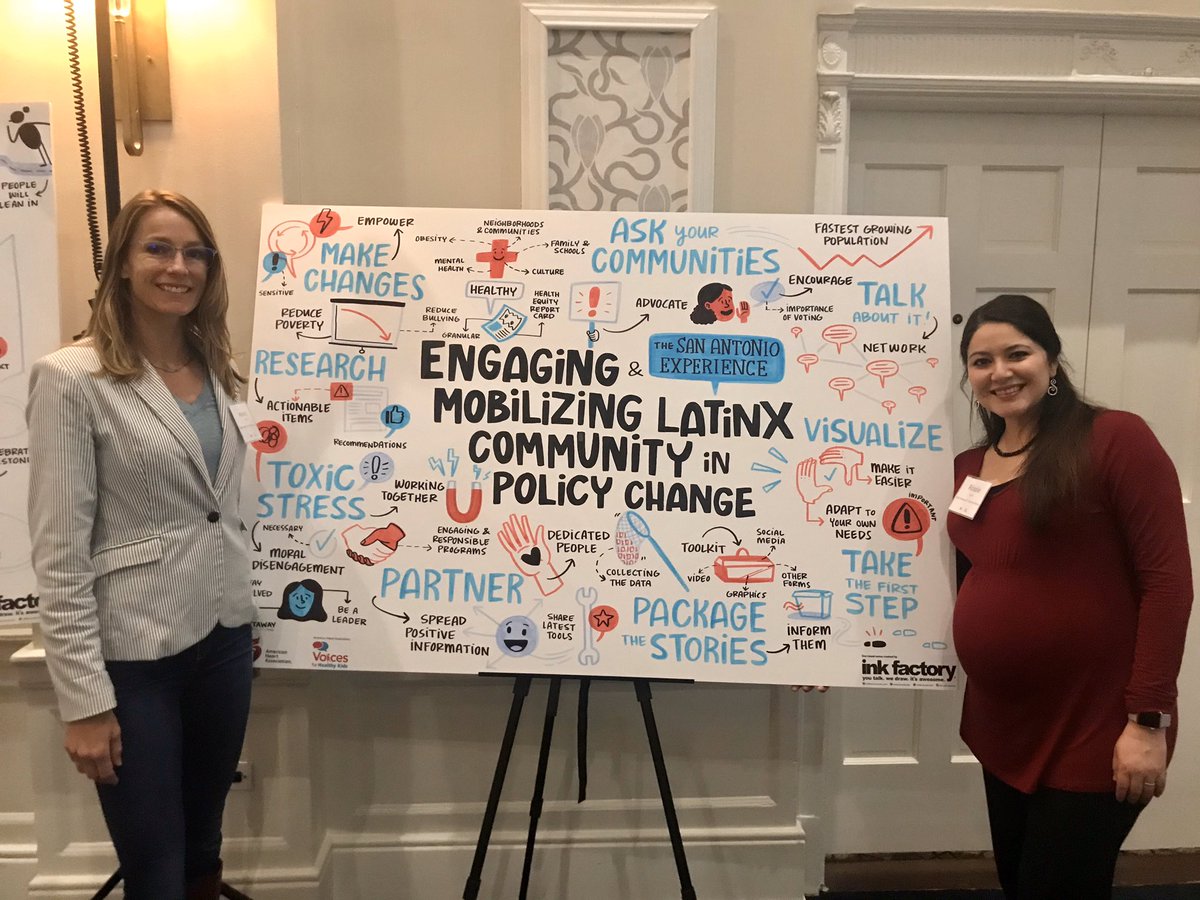
Merck, reflecting on her own life, said she experienced a lot of childhood trauma, or adverse childhood experiences (ACES), growing up.
ACEs─from divorce to poverty to neglect and abuse─can change a child’s brain and body and have negative, lasting effects on health and well-being. Exposure to ACEs is linked to obesity, risky behaviors, mental health issues, cognitive impairment, and more.
Merck helped launch two action packs to improve trauma-sensitive care.
The Salud America! “Trauma Sensitive School Action Pack” guides school leader to build a support team and craft a system to identify and support traumatized students. The Salud America! “Handle With Care Action Pack” helps police notify schools when they encounter children at a traumatic scene, so schools can provide support right away.
“When I learned the science of ACEs, compounding poverty and hardships, we can’t just address immediate social needs of families experiencing poverty and trauma,” Merck said. “We need to address social and structural inequities.”
This is what drives her work.
“It became my passion,” Merck said. “Once you realize how many kids are living in poverty and facing numerous barriers, it just seems like a waste of time to not tackle the root causes, like lack of affordable housing, transportation and child care.”
Through all these experiences, Merck continues to tackle those environment-wide root causes, rather than individual behaviors.
“I realized how absurd it was to apply individual-level, physical activity promotion to my own family growing up,” Merck said. “My single-mother of two was a waitress and probably got more than 20,000 steps a day. What she needed was GED prep classes, an equitable income, childcare, and access to legal services. She did not need to attend wellness classes.”
She also realized how absurd it was to promote 10,000-steps-a-day in her current city where streets in many communities lack safe sidewalks and crosswalks, which is evidenced by the low Walk Score (38) and average weekly pedestrian fatality.
The San Antonio metro area’s Pedestrian Danger Index increased from over 96 in 2014 to over 131 in 2019, far worse than the national average of 55.3.
“The way we design city streets is a major factor in reducing pedestrian deaths, promoting incremental bouts of walking throughout the day, and increasing access to opportunity,” Merck said.
What’s Next for Merck?
Merck isn’t slowing down, either.
She’s studying for a doctoral degree in urban planning from University of Illinois at Urbana-Champaign. 
Through her Salud America! content, Merck continues to make the relationship between civic engagement and equity a priority.
For example, she wrote a piece about why cities need a local health board and why public health professionals should pay attention to transportation issues. She has even written commentaries for a local online news source.
“Only 1 in 2 big U.S. localities—500,000 or more people—have a local board of health, compared to over eight in ten small localities—less than 50,000 people,” Merck wrote. “That means half our big cities miss out on public input on important health decisions. Half our big cities do not connect their local health departments to the community they serve or other public officials.”
Merck also is helping others speak up for health equity issues.
She speaks at community events in San Antonio and conferences across the nation.
She is the primary leader of Salud America!’s work to bring together a new workgroup of transportation, affordable housing, and health leaders from all across the country to promote equity in active and public transportation for Latinos.
Merck’s workgroup published their findings in October 2020.
“Our workgroup is having discussions, participating in learning modules, and starting to yield some strategies in addressing gaps in planning policies and practice in transit and active transportation to influence state, regional, and local transportation policy,” Merck said. “People from all sides of the transportation industry are involved, and that’s the kind of cross-sector engagement we need.”
Explore More:
Transportation & MobilityBy The Numbers
27
percent
of Latinos rely on public transit (compared to 14% of whites).
This success story was produced by Salud America! with support from the Robert Wood Johnson Foundation.
The stories are intended for educational and informative purposes. References to specific policymakers, individuals, schools, policies, or companies have been included solely to advance these purposes and do not constitute an endorsement, sponsorship, or recommendation. Stories are based on and told by real community members and are the opinions and views of the individuals whose stories are told. Organization and activities described were not supported by Salud America! or the Robert Wood Johnson Foundation and do not necessarily represent the views of Salud America! or the Robert Wood Johnson Foundation.

